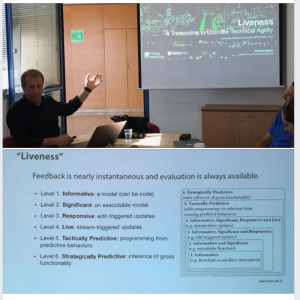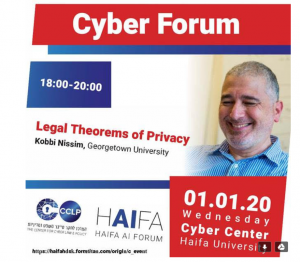Colloquia and Industry Meetups
Colloquia usually take place on the 4th Monday of the month, 14:00-16:00 (full 2 hours).
Unless specified otherwise, colloquia are held in Room 1505 Rabin Building at the main University campus on Mount Carmel.
There are usually 3 presentations, some by industry/public sector and some by faculty members, with some additional time for discussion
Directions: click here for the University transportation pages. You can also consult a campus map.
Industry Meetups take place 3 times a year on a Thursday 17:00-19:00 at the Downtown campus, Dylan Tauber Building, 16 HaNamal Street, Haifa. Click +Haifa/@32.818353,34.9990793,17z/data=!3m1!4b1!4m5!3m4!1s0x151dba3664074463:0x573b9cb1025240f0!8m2!3d32.8183485!4d35.001268″>here for directions.
Mailing list: if you want to be on our mailing list and receive notifications of upcoming talks,
Calendar: You can add the Center’s events to your Google calendar using the link below. You can also import it to other calendar providers (such as Outlook and iCal) using one of the following urls , ,
News:
Enabling the future of academic research with the Twitter API – release of a new twitter API to extract research data.
26/1/2021, By Adam Tornes and Leanne Trujillo
Upcoming events:
Monday 28 October, 2019 MONTHLY COLLOQUIUM: AI FOR HEALTHCARE – 3 talks
Dr. Michal Rosen-Zvi, Director, Healthcare informatics, IBM Research labs & Visiting Professor, Faculty of Medicine, The Hebrew University
Title: “Combatting Cancer through AI technologies: the case of breast cancer”
Dr. Yishai Shimoni, Machine Learning for Healthcare and Life Sciences Group, IBM Haifa Research Lab
Title: “Machine learning for drug analysis from real-world”
Dr. Pavel Goldstein, School of Public Health, University of Haifa, Israel
Title: “An integrative approach for pain assessment”
Abstracts and bios
Thursday 14 November, 2019 Industry Meetup: Intel’s Advanced Analytics Group
@HaNamal Campus (16 Hanamal St., Haifa, 17:00-19:00)
Click here for details
Related events
Wed-Thu 20-21 November, 2019 Intel’s Hackathon: AI for Social Good @Intel Petch-Tikva
https://events.bizzabo.com/218444
Past events:
Tuesday 22 October, 2019 SPECIAL COLLOQUIUM
Prof. Ademar Aguiar, Department of Information Engineering, University of Porto, Portugal
Liveness — a trampoline to ultimate technical agility
Abstract and bio
Wed-Thu 23-24 October, 2019 ARTATHON
Click here for event description
________________________________________
University of Haifa Data Science Research Colloquium,
Maintained by Tamir Gadot tamir’s email
University of Haifa Data Science Research Center
SPECIAL RESEARCH COLLOQUIUM
“Liveness — a trampoline to ultimate technical agility”
Prof. Ademar Aguiar | DEI FEUP U.Porto
Department of Information Engineering
University of Porto
Porto, Portugal
Tuesday, October 22th, 2017, 10:30 am to 11:30 am
CRI, Education Building, room 570
ABSTRACT:
Live programming is an idea espoused by programming environments from the earliest days of computing, such as Lisp machines, Logo, Hypercard, and Smalltalk. In common with all these systems is liveness — a feedback nearly instantaneous and evaluation always accessible.
In this talk, we will present undergoing research work aiming to bring liveness to more software development activities as a way to improve technical agility, so that software can be faster to write, visualize and understand, with the support of a few features of a Live Software Development Environment.
Bio: Ademar Aguiar is a Professor at Faculty of Engineering of University of Porto (FEUP) and researcher at INESC Porto, with over more than 20 years of experience on software development, software architecture and design (patterns, frameworks, infrastructures), agile methods, wikis, and open collaboration tools.
Current research interests include knowledge management practices and tools for software development teams and organizations (from code to documentations) using wiki-based philosophy and open collaboration tools.
Beyond the field of software engineering, Ademar is also exploring and applying Web 2.0 and social software to other audiences and fields, being presently the most important a social learning environment for schools and their communities (PLE/SLE).
https://sigarra.up.pt/feup/en/func_geral.formview?p_codigo=231081
היום התקיימה הרצאה ראשונה בחסות מרכז מחקר מדעי הנתונים של אוניברסיטת חיפה!
אדמאר אגויר מאוניברסיטת פורטו שבפורטוגל הרצה על איך אפשר לכתוב קוד כל כך אג׳ילי שהוא ממש חי! כלומר הקוד כולו פרמטרי והמשתמש יכול להביע את בחירתו מ סקאלה של אפשרויות והקוד מגיב מיידית לאינפוטים של המשתמש. ותוצר התוכנה מייד מראה את האפקט למשתמש, קצת כמו שאנחנו עובדים בגוגל דוק והשינוי מייד מתעדכן בענן. אבל זה לא מספיק, הקוד יוכל גם לצפות מה המשתמש כנראה ירצה לעשות ואילו דרישות חדשות תהיינה לו!
בהקשר של מדעי הנתונים, המשתמש יוכל להגיד מה בתוצאות חשוב שיהיה בולט וזה מייד ישתקף בהן! למשל, שיהיה ייצוג ויזואלי להבדלים הכי גדולים שיש בין קבוצות של עצמים, נניח בין תוכניות לימוד של מדעי הנתונים מול מדעי המחשב או בין תוכנית הלימודים שלנו מול זו של הטכניון (סתם דוגמאות)
University of Haifa Data Science Research Center
MONTHLY RESEARCH COLLOQUIUM
October 2019: AI for Healthcare – 3 talks
28/10 14:00-16:00
University of Haifa, Education Building, room 570
“Combatting Cancer through AI technologies: the case of breast cancer”
Michal Rosen-Zvi, PhD, Director, Healthcare informatics, IBM Research Labs, Visiting Professor, Faculty of Medicine, The Hebrew University
In this talk I will review AI technologies that can be leveraged for combating cancer. I will focus on breast cancer and talk about gaps and challenges. I will share recent results of various teams aiming at detecting cancer in screening mammography images. I will end with a review of a deep learning algorithm that was trained on a linked dataset of mammograms and electronic health records and achieved breast cancer identification accuracy comparable to radiologists as defined by the Breast Cancer Surveillance Consortium benchmark for screening digital mammography. The algorithm has also revealed additional clinical risk features. The algorithm exhibits the potential to reduce the likelihood of breast cancer misdiagnosis. These results appear in a recent publication, see https://www.ncbi.nlm.nih.gov/pubmed/31210611.
Dr. Rosen-Zvi is the Director for Health Informatics at IBM Research and a visiting Professor at the Faculty of Medicine, the Hebrew University. She did PhD in computational physics at Bar-Ilan University and performed postdoctoral studies in Machine Learning at UC Berkeley and the Hebrew University. She is a co-author of more than 40 papers in peer reviewed venues and has five patents. She is also heading the Health Informatics Department at IBM Research, Haifa. She is a member of the Israeli National Council of Digital Health and Innovation at health services and she is co-leading a subcommittee on innovative and disruptive technologies.
“Machine learning for drug analysis from real-world”
Yishai Shimoni, PhD, Machine Learning for Healthcare and Life Sciences Group, IBM Haifa Research Labs
The increasing availability of healthcare data provides an opportunity to evaluate the effect of various interventions on various outcomes, such as disease-related clinical outcomes, adverse events, and cost. However, analysis of real-world data is notoriously biased, and requires carefully constructed machine learning methods to detect and correct these biases. In this talk I will briefly explain some of the biases that appear in the data, how we overcome them, and applications for such technology.
Dr. Shimoni is the manager of the Machine Learning for Healthcare and Life-Sciences group at IBM Research, Haifa. He has a PhD in Physics from the Hebrew University, and did his post doc at Columbia University in New York. He has over 20 publications and 3 patents, and has more than 15 years of experience in analyzing biological and clinical data and applying advanced computational methods to these data.
“An integrative approach for pain assessment”
Pavel Goldstein, PhD,
School of Public Health, University of Haifa, Israel
Chronic pain affects 20% of the worldwide population, with costs greater than that of heart disease, cancer, and diabetes combined, and is the main cause of the opioid crisis. A critical challenge in pain management emerges from the fact that pain cannot be directly measured. Therefore, the current gold standard for the assessment of pain is self-reporting. However, Patient self-reports of pain are however influenced by subjective pain tolerance, memories of past painful episodes and current context, and their willingness and honesty in reporting pain level. Therefore, objective measures of pain are needed to better inform pain management.
In this talk, I will present my recent research that focuses on pain estimation in close to real-life settings through its expression across a range of channels — voice, and physiological/neural markers and body maps of multiple emotions. Particularly, I will present our mobile platform for tracking chronic pain patients that collects bodily representations of different emotions and pain, and audio/video records of pain narratives. In addition, I will present a wearable system, which objectively quantifies user’s pain perception based- on multiple physiological signals using sweep impedance profiling (SIP), electroencephalography (EEG), photoplethysmogram (PPG) and galvanic skin response (GSR). Based on the research, I am seeking to develop new tools for pain measurement and treatment.
Dr. Pavel Goldstein is a director of the Integrative Pain (iPain) Laboratory, located at the School of Public Health (University of Haifa) and a director of the Master Biostatistics track (in development). He has a Master’s degree in Biostatistics, a PhD in Social Neuroscience from the University of Haifa and did a postdoc at the University of Colorado Boulder. Dr. Goldstein has 15 publications and 1 patent and more than 10 years of data science consultations experience for industry and academia.
First Industry Meetup
14 November, 2019 @16 Hanamal St., Haifa: Talk by Intel’s AI group
The planned schedule is:
17:00-17:15 Introduction of the Data Science Roundtable/Meetup
17:15-18:00 Intel AI people (Industrial point of view)
18:00-18:30 Open Discussion “How can we promote collaboration between our research center and industry?”
18:30-19:00 Planning of the next meeting and expectations from the Meetup series



